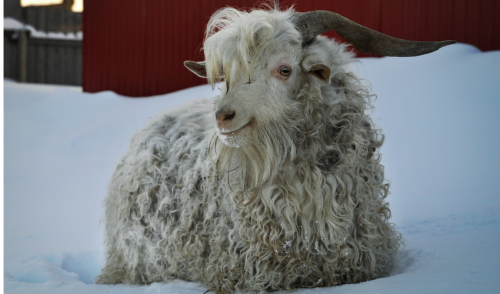
Preparing and Caring for Goats in Winter
Goats are robust, hardy animals, but they do require extra care in winter to stay healthy and thrive. With the right preparation and proper winter care, however, the chills and hazards of winter don’t need to slow your goats down a bit.
How Winter Can Impact Goats
Goats are not immune to cold, and the snow and ice of winter can create problems for even the healthiest, hardiest goats. Icy surfaces can be extreme slip and fall hazards, causing hoof injuries, broken bones, or joint dislocations. Predators are more active in winter as other prey may be hibernating, and goats could be tempting targets. Even in secure shelters, goats are susceptible to the buildup of urine and feces debris and toxic fumes that can cause lung infections or infected hooves. Because goats can be fussy about the temperature of their water, they may drink less in winter and could more easily develop urinary tract infections, and of course all livestock is at greater risk for diseases in winter, including goats. Kids and pregnant nannies are especially vulnerable to the hazards of winter, but it is easy to protect your entire goat herd.
Preparing Goats for Winter
It is best to take steps to protect goats from winter’s risks long before winter arrives. An autumn veterinary exam can help pinpoint any potential problems so they can be corrected before bad weather hits. Vaccinations should be updated, and providing zinc and copper supplements can help goats grow thick, lush winter coats for warm insulation.
Taking steps to strengthen and insulate goats’ shelter will help the animals be more comfortable and safer through the winter months. The roof should be double-checked for leaks, and the entire structure should have adequate ventilation and air circulation. Good flooring will also help keep the animals off a damp or dirty floor to protect their hooves. Any holes or weak spots in the shelter should be fixed to ensure predators and pests can’t get in. Furthermore, adding extra windbreaks in the corral or exercise area can help protect goats in winter while still giving them options for outdoor exercise and stimulation.
In extreme cases, it may be wise to cull a goat herd before the worst winter weather arrives. Old or sickly goats with little chance of improvement will use extensive resources and take up space in the shelter. If they are removed from the herd, the remaining animals will be better equipped to withstand the cold season.
Caring for Goats in Winter
There are many easy steps you can take to be sure your goats are safe, comfortable, and healthy through the winter. To give your goats the best winter life…
- Adjust feed to provide additional roughage, including hay and grass, so goats have enough calories to generate suitable body heat in cold temperatures. Extra grain rations can also be helpful to feed winter goats.
- Provide deeper bedding in winter to keep goats out of puddles, slush, and mud that can cause deeper chills. Bedding should be kept as dry as possible and changed regularly to avoid buildup of mud and feces.
- Inspect goats’ hooves every month and trim them as needed to provide the best surface area for safe traction on icy surfaces. Clean out the hooves at the same time to prevent any impaction and other problems with footing.
- Supply warm water or a heated watering trough to goats to encourage appropriate drinking through the winter. This will help the animals avoid getting chilled by eating snow or ice, or developing infections from dehydration.
- Provide enrichment for the herd whenever possible, including clearing snow for play areas, offering mineral blocks to lick, changing toys occasionally, and using different platforms or hay bales for climbing surfaces to keep goats entertained and out of mischief.
- Inspect fences and gates regularly to check for signs of gnawing, butting, or other damage from bored goats, and make repairs as needed to avoid any chance of escapes, injuries, or other problems from loose boards or sharp edges.
- Be alert to signs of illness, including coughing, appetite loss, runny eyes, or fatigue. Call a veterinarian as soon as possible if any symptoms are detected to minimize the risk of spreading diseases to several animals.
With good preparation and proper care, your goats can be comfortable, safe, healthy, and happy through even the coldest winter months.
